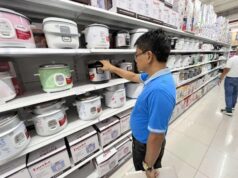ANGELES CITY – Some 1,500 delegates to the 2015 Asia-Pacific Economic Cooperation (APEC) are expected to flock to this city by end of January to February next year to begin a series of meetings that will culminate in the Leaders’ Summit later in November.
Laura Q. Del Rosario, foreign affairs undersecretary for international economic affairs, also said the two-week meeting will tackle every aspect of the economy including technical working groups on health, illegal logging, energy, transportation, and anti-corruption.
“Then they report to the senior officials who will meet for three days and then they end up with an action plan to be carried to the next senior officials meeting in Boracay in May,” she said.
Del Rosario, who spoke at the media forum “Batirulan quing Kape Juan” at the Holy Angel University (HAU) here organized jointly by the Capampangan in Media, Inc. (CAMI) and the university in cooperation with the Clark Development Corp. and the Social Security System, said the third APEC officials’ meeting will be held in Cebu by August and the last will be the Leaders’ Summit in Manila in November.
Del Rosario said some 2,400 are expected to attend the meeting in Boracay while about 3,000 are expected to join the Cebu meeting before the concluding meeting with senior officials in Manila where around 4,000 are expected to attend leading to the APEC Leaders’ Summit Meeting from 21 nations in November.
She said the number of officials attending the meetings increase because “it will be back-to-back with the ministers related to the trade meetings.” Del Rosario also said there will be ministerial meetings in between where the “blue economy and agriculture issues” will be tackled. “For every priority we have ministerial meetings,” she explained.
“In between, the ministers will meet, like the ministers of transportation in Cebu sometime in October for three days,” she said. “Ministers for energy will also meet in Cebu while the ministers for agriculture and natural resources and economy will meet in Iloilo for seven days,” she added.
“So in between we have three months to breathe to see if we are implementing what we have discussed and the action plans that we have taken,” Del Rosario said. “We carry on the free-trade agreements for Asia-Pacific and how to define it and present the road map for the eventual integration,” she added.
These will be based, Del Rosario explained, on high level policy dialogues like science in education and the blue economy which falls under sustainability “because people in the Pacific region are overfishing with the fish catch getting smaller.”
So we are going to talk about regulating fishing if the Chinese are willing to be regulated, she said.
“And so with the Taiwanese and the Japanese but we have to come out with a certain action because we cannot sacrifice the future,” she added.



